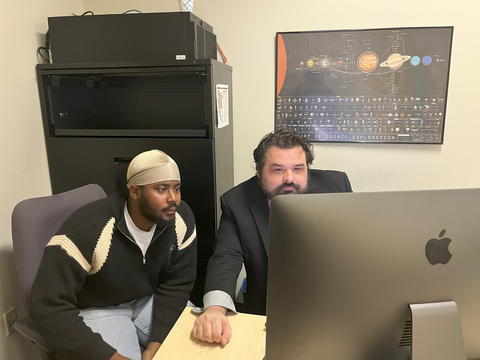SPIE, the international society for optics and photonics, and the IBM-HBCU Quantum Center have selected Patrick Flanigan, a principal investigator at North Carolina Central University (NCCU), as this year’s recipient of the IBM-SPIE HBCU Faculty Accelerator Award in Quantum Optics and Photonics.
This press release features multimedia. View the full release here: https://www.businesswire.com/news/home/20241217039072/en/

2024 IBM-SPIE HBCU Faculty Accelerator Award in Quantum Optics and Photonics recipient Patrick Flanigan, right, with student Joseph Nduka. (Photo: Business Wire)
The $100,000 annual award, presented jointly by SPIE and the IBM-HBCU Quantum Center, supports and promotes research and education in quantum optics and photonics within IBM-HBCU Quantum Center member institutions, which currently includes 27 historically Black colleges and universities (HBCUs). The first three named faculty-award recipients were Renu Tripathi, a professor of physics and engineering at Delaware State University; Wesley Sims, an assistant professor of physics at Morehouse College; and a group project at Tuskegee University.
Flanigan’s project will explore how to significantly reduce the footprint of future photon-based quantum-computing and quantum-information systems, as well as enable the exploration of new physics that may emerge in the chip-scale system.
“Triple-resonance micro-ring resonators for on-chip entangled photon generation via spontaneous six-wave mixing (SSWM)” has a core quantum optics-and-photonics focus: The SSWM technique is used to produce a trio of quantum entangled photons by simultaneously exciting three energy transitions in a rubidium (Rb) atom. The goal of the project is to design nanophotonic components to miniaturize the platform for SSWM, which so far has been only achieved in free space on an optical table.
The award will also cover Flanigan’s official supervision and mentorship of an NCCU graduate student. In addition, Flanigan will be working with multiple colleagues. At NCCU, Professor Branislav Vlahovic will contribute his expertise on quantum computing and Professor Yongan Tang will share his expertise on electromagnetic simulations. The fabrication and experimentation of the triple-resonance micro-rings will be done by Professor Qing Gu of North Carolina State University. The foundational theory of entangled photon generation by SSWM was developed by Professor Jianming Wen of State University of New York at Binghamton.
“SPIE is particularly proud of our partnership with the IBM-HBCU Quantum Center and our shared support of quantum research programs at HBCUs,” said SPIE CEO Kent Rochford. “The impact of quantum science continues to grow, and we are very excited – especially as the project resulting from this award coincides with the United Nations-declared International Year of Quantum Science and Technology in 2025 – to support Patrick Flanigan in his and his colleagues’ efforts to further enhance the range and application of quantum-related research.”
“The IBM-SPIE HBCU Faculty Accelerator Award plays an important role in the IBM-HBCU Quantum Center’s overall effort to build an ecosystem for traditionally underrepresented students and professionals to be a part of the quantum industry,” said Dr. Kayla Lee, Global Lead, Ecosystem Growth at IBM Quantum. “Dr. Flanigan’s project is a perfect example of the cross-institution collaboration that makes the award and center a success — and pushes the industry forward.”
“Winning this award is a great honor, and I am very thankful to all my collaborators in and outside of NCCU for their help,” said Flanigan. “The physical mechanism underlying this project was experimentally demonstrated only a few months ago, so it is very exciting to be on the cutting-edge of quantum computing and quantum communications research. Winning this award will allow us to continue our work and expand by obtaining new equipment and taking on new students.”
For more on the IBM-SPIE HBCU Faculty Accelerator Award in Quantum Optics and Photonics, please visit our dedicated webpage.
About SPIE
SPIE, the international society for optics and photonics, brings engineers, scientists, students, and business professionals together to advance light-based science and technology. The Society, founded in 1955, connects and engages with our global constituency through industry-leading conferences and exhibitions; publications of conference proceedings, books, and journals in the SPIE Digital Library; and career-building opportunities. Over the past five years, we have invested more than $25 million in the international optics community through our advocacy and support, including scholarships, educational resources, travel grants, endowed gifts, and public-policy development. www.spie.org.
View source version on businesswire.com: https://www.businesswire.com/news/home/20241217039072/en/